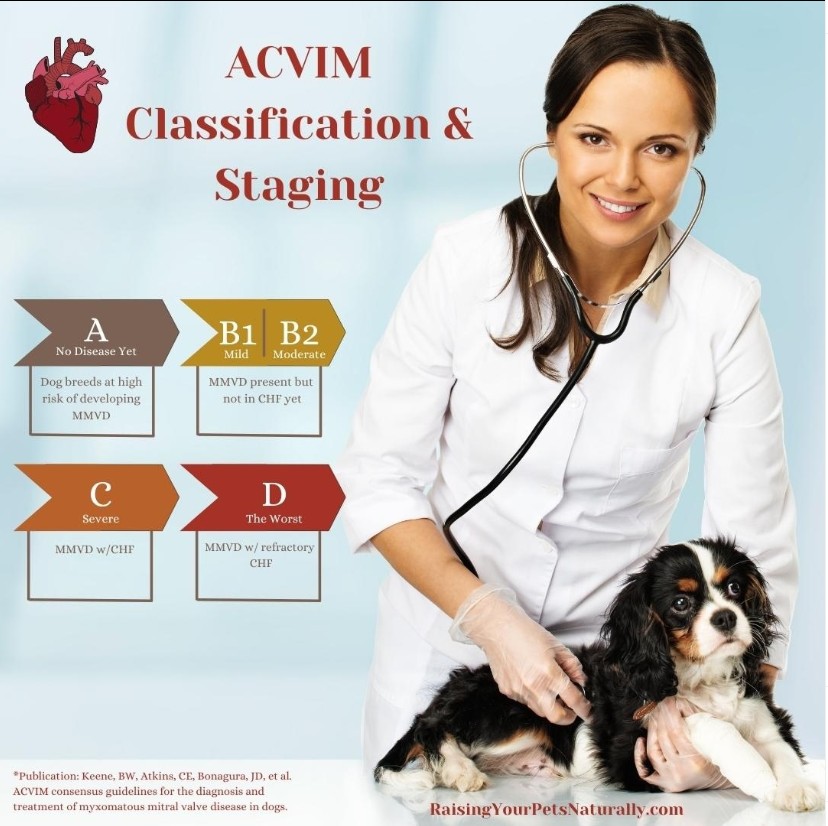Google Adsense—>

Heart Disease in Dogs: What You Need To Know
MVD in Dogs and Cavalier King Charles Spaniels

If you are a Cavalier King Charles Spaniel guardian, you should know about heart disease in dogs, particularly degenerative mitral valve disease (MVD). I thought it would be a good idea to interview two veterinarians: Dexter’s cardiologist, WA Brown, DVM, DACVIM; and a holistic veterinarian, Judy Morgan, DVM, CVA, CVCP, CVFT.
When I’m trying to understand something, I try to get to the root of things. I asked Dr. Brown to explain what MVD in dogs really is and what it does. Dr. Brown explained that “degenerative mitral valve disease is a gradual degeneration of the valve tissue. Cardiac valves are made out of connective tissue. Over the course of several years, the tissue deteriorates and the valve begins to leak. This process most often affects the mitral valve, but it can also involve the tricuspid valve.”
He continues to say, “Certain breeds are considered to be at increased risk for developing degenerative valve disease. Based on this observation, it is clear that genetics plays a role in disease development. While any breed can develop valve disease, Cavalier King Charles Spaniels are at the greatest risk for developing degenerative mitral valve disease. Other breeds that are commonly affected: Chihuahuas, miniature poodles, all types of terriers, dachshunds, whippets, Shih Tzus. Virtually all breeds of small dogs are commonly seen.”
Dr. Brown says, “The prime determinants of degenerative valve disease seem to be age (increasing risk with increasing age) and genetics (certain breeds have higher risk). At-risk breeds should be closely examined (cardiac auscultation) annually, to determine if they have a murmur. The presence of a murmur is often the first sign that a dog has degenerative valve disease.”
Because Cavaliers have a high risk of developing heart disease, I have always been proactive with caring and monitoring Dexter’s heart. Starting at Dexter’s first birthday, he has had yearly cardiac auscultations from a veterinary cardiologist. Around age five, it was determined that Dexter had some premature heart beats. We decided to do an echocardiogram to evaluate his heart size, heart function, and blood flow. We also did a 24-hour Holter monitor that measured and recorded Dexter’s heart’s activity (ECG). I wanted to know all I could about what was going on with Dexter’s heart, so I could make the best choices for his care and support.

Everything turned out okay, without any sign of a heart murmur. As Dr. Brown said, “The presence of a murmur is often the first sign that a dog has degenerative valve disease.” At this time, he did not have a murmur. Our take-home was to reevaluate the following year, unless one of Dexter’s vets heard anything unusual during our quarterly visits.
Since Dexter had the very beginnings of MVD, I talked to holistic veterinarian, Dr. Judy Morgan, about what kinds of foods and supplements I should be adding to Dexter’s routine to be as heart-healthy as I possibly could.
Dr. Morgan explains, “From a Traditional Chinese Veterinary Medicine (TCVM) perspective, the Heart dominates the Blood and vessels, houses the Minds, controls sweat, and opens into the tongue (voice). The heart governs the circulation of blood through the vessels by having healthy Heart Qi, or energy. The blood supplies nutrients to cells throughout the body. A patient with Deficient Heart Qi and Blood will have weak, thready pulses, and pale color tongue and gums.”
She continues to say, “The Shen is best translated as the Spirit or Mind. The Heart plays a role in mental activities, memory, and sleep. Deficiency in Heart Blood can disrupt normal mental function, resulting in abnormal behaviors such as restlessness or anxiety. Rapid heart rate, irregular heart rhythm, and pale tongue may be present. The tongue is the opening associated with the heart. Heart controls the color and appearance of the tongue at the tip of the tongue. A pale tongue indicates Deficient Heart Blood and a dark red tongue tip reveals Heat accumulation in the Heart.
Heart Qi Deficiency is seen in MVD, usually in older animals as a result of the gradual decline of the Heart Qi. It can also be due to a genetic predilection, as a result of an underlying Jing Deficiency. Symptoms include heart rhythm abnormalities, difficult respiration, generalized weakness, fatigue, exercise intolerance, and fainting. Tongue will be pale to purple, and pulse will be weak. The body tends to become cold and there is excess accumulation of fluids (fluid can be in the lungs or abdomen – ascites).”
Feeding a dog a high-quality home-cooked or raw dog food is ideal for a dog with heart disease. A mantra I hear from Dr. Morgan all the time is “like feeds like.” For this instance, feeding a dog a quality diet that includes heart muscle is recommended.
In Dr. Morgan’s book, From Needles To Natural, she also suggests adding hawthorn berry, as it widens the coronary arteries and boosts blood circulation and can help regulate abnormal rhythms. She also recommends supplements such as CoQ10, L-arginine, L-carnitine, taurine, chromium, and omega-3 fatty acids.

Because I knew Cavaliers are prone to heart disease, Dexter was already getting a lot of these supplements and foods. Dr. Morgan and I did tweak his maintenance dose to more of a therapeutic dose with his diagnosis.
I continued to see Dr. Brown for Dexter’s yearly cardiac auscultation. This year (age 7.5), his premature heartbeats officially turned into a grade 1 heart murmur. I have to admit, even though I knew we were heading this way, my heart still sank at the news.
Dr. Brown explained to me how murmurs are graded. “Murmurs are graded on a scale from 1 to 6. The number simply denotes the loudness (or intensity of the murmur). It does not describe the disease severity. Grade 1-2 murmurs are soft. Grade 3-4 murmurs are moderately loud. Grade 5-6 murmurs are very loud and are associated with a vibration on the chest (a palpable thrill). While it is true that louder murmurs are a bigger concern, it would be wrong to assume that the loudness of the murmur equates with the severity of the disease.”
While I was trying to comprehend that Dexter officially had a heart murmur, I also wanted to know what I need to look for and be aware of throughout his life. I didn’t want to miss a sign that he was in distress or declining.
Dr. Brown explains, “Unfortunately, all of the clinical signs associated with heart disease come at the end of the disease process. Most dogs remain asymptomatic as the disease is developing. Coughing, labored breathing, weakness, collapse, and exercise intolerance are associated with congestive heart failure. Again, congestive heart failure occurs after a patient has already developed severe, advanced disease. Pet owners should be aware that “the absence of clinical signs” does not guarantee that their pet does not have a serious cardiac condition. As with many diseases, early treatment is recommended for the best outcome and long-term survival.”
At this time, Dr. Brown wants to see Dexter again in a year to assess his heart. If any of Dexter’s vets see a change in his heart, we will do it sooner. I will continue to feed Dexter a high-quality, home-cooked diet, provide him with heart-healthy supplements and foods, continue to ensure he receives adequate exercise, and keep him at his ideal weight.
If you have a dog prone to heart disease, such as a Cavalier King Charles spaniel, Chihuahua, miniature poodle, terrier, dachshund, whippet, or Shih Tzu, you should look into a yearly visit with a veterinary cardiologist. Or if your dog exhibits coughing, labored breathing, weakness, collapse, or exercise intolerance, please have a conversation with your veterinarian about heart disease. Remember, our pets are counting on us to be their advocates.
Don’t forget to subscribe to our Cavalier King Charles Spaniel Tips and Fun channel for more free content.
More on MVD and treatment options.


Do you have a dog breed prone to heart disease? Tell me in the comments.
Are you looking for even more ways to stay up to date with Raising Your Pets Naturally? Sign up for the newsletter for more tips and promotions. Don’t forget to be social and Like, Follow and Subscribe. Comments below are always welcome.
Facebook Twitter Pinterest Instagram YouTube
 |
 |
Google Adsense—>





Thank you Tonya for all the great information! It is very helpful!
<3 Glad to help.